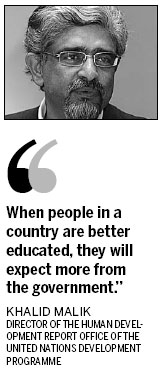UN official urges China to share success story with world

Developing economies that have experienced dynamic growth are reshaping the world and should share this success with their partners, a UN official said.
Khalid Malik, director of the Human Development Report Office of the United Nations Development Programme, told China Daily that more than 40 developing economies, including China and the other four BRICS countries, have done better than expected in terms of human development.
A UN official who worked in China for seven years, Malik affirmed the country's progress in human development, a concept that includes poverty reduction and infrastructure modernization.
Malik said that China will face the challenge of balancing economic growth with environmental concerns and social development.
China, together with other developing economies, must address the issues of aging, the environment and inequality to sustain current progress, Malik said, urging Beijing to share its experience with other developing countries.
To tackle these issues, the government should pay more attention to the policies that focus on human development, he added.
China has now lifted more than 510 million people out of poverty since 1990 and has seen the proportion of the population living on less than $1.25 a day fall from 60.2 percent in 1990 to 13.1 percent in 2005.
Through these efforts, the UN's Millennium Development Goal target of halving poverty relative to 1990 levels was met three years before the 2015 deadline.
Malik's remarks were echoed by the newly released UNDP's 2013 Human Development Report, which was initiated in 1990 and uses income, public health and education as factors to measure the comprehensive development level of countries.
Rise of the South
The report said that the rise of the South is unprecedented in its speed and scale.
It also said China's human development remained higher than the average level in East Asia and the Asia-Pacific region.
China's Human Development Index has increased from 0.695 in 2011 to 0.699, remaining above regional and BRICS averages, which came in at 0.683 and 0.655, the report said.
Globally, China's HDI ranking remains the same at 101 out of 187 countries, and the new HDI figure represents a remarkable increase of 72 percent from 0.407 in 1980.
According to the report, never in history have the living conditions and prospects of so many people changed so dramatically and so fast.
By 2030, more than 80 percent of the world's middle class will live in the South, the report said. The Asia-Pacific region will be home to about 67 percent of the new global middle class, with billions of people becoming increasingly educated, socially engaged and internationally connected, though at significantly lower income levels than their counterparts in the middle class of the industrialized North, it said.
Malik said the progress in human development in the South can also bring micro-changes to each specific country by changing the relationship between citizen and state.
"When people in a country are better educated, they will expect more from the government," and in this way more democracy will be introduced into society, Malik said.
Less unequal world
As the report said, the world is becoming less unequal, based on the fact that all groups and regions have seen a notable improvement in all HDI components, with faster progress in low and medium HDI countries.
Helen Clark, the UNDP administrator, said in the report's foreword that emerging powers are "already sources of innovative social and economic policies", adding that they are also major trade, investment and development cooperation partners for other developing economies.
Developing economies should play a bigger role in international affairs, Malik said. To maintain rapid growth, the South needs to let its partners benefit from its progress, he said.
The South should further improve its economic capacities, so that it can participate more fully in the world economy and have its voice heard, said Zhu Feng, a professor on international affairs with Peking University.
Although developing countries have made progress in human development, the North still dominates the world economic systems, Zhu said.
zhouwa@chinadaily.com.cn
(China Daily 04/02/2013 page11)














